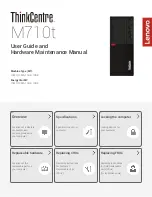
GUF-Yocto-jethro-9.0-r7707-0
i.MX6
User Manual
frame.can_dlc,
frame.data[0]);
}
Example 5
shows how a CAN message with four bytes with the standard ID 0x20 is sent on
can0
from the Linux
shell, using the
cansend
tool. The CAN bus has to be physically prepared properly and there has to by at least
one other node that is configured to read on this message ID for this task. Furthermore, all nodes must have the
same bittiming.
root@santaro:~# cansend can0 -i 0x20 0xca 0xbe 0xca 0xbe
Example 6
shows how all CAN messages are read on
can0
using the
candump
tool:
root@santaro:~# candump can0
A more detailled documentation of the CAN bus handling in the Linux kernel can be found in the documentation
directory of the Linux kernel source tree.
6.9
USB
There are two general types of USB devices:
USB Host
: the Linux platform device is the host and controls several devices supported by corresponding
Linux drivers
USB Device
: the Linux platform device acts as a USB device itself by emulating a specific device type
Additionally, if supported, an OTG-enabled port can automatically detect, which of the above roles the platform
plays during the plugging process.
6.9.1 USB Host
For USB Host functionality, Garz & Fricke platforms per default support the following devices:
USB Mass Storage
USB Keyboard
There are many more device drivers available in the Linux kernel. They are not activated by default, because
Garz & Fricke cannot maintain and test the huge amount of existing drivers. Instead, the customer may do this
himself or engage Garz & Fricke to implement his special use case. Existing drivers can easily be activated by
reconfiguring and rebuilding the Linux kernel inside the BSP.
The USB Host bus can also be directly accessed by using
libusb
. This library is installed on Garz & Fricke
platforms per default.
Further information about libusb can be found under:
http://libusb.sourceforge.net/api-1.0
Note:
If libusb is used to access the USB bus directly, the user is responsible to keep the interoper-
ability consistent with all other USB devices that are controlled by the Linux kernel.
6.9.2 USB Device
For USB Device functionality, the following device emulations are supported per default:
USB Serial Gadget
Again, further drivers can be activated by reconfiguring the Linux kernel. The USB Device drivers are not compiled
into the kernel by default, but are located as modules in the file system. In order to use the Serial Gadget for
example, the according module has to be loaded:
root@santaro:~# modprobe g_serial
The Serial Gadget creates a virtual serial port over USB, accessible via the device node
/dev/ttyGS0
.
41
















































